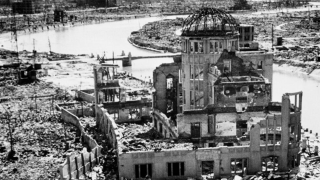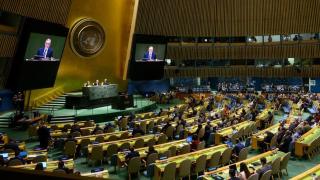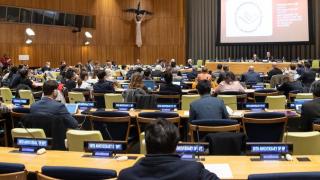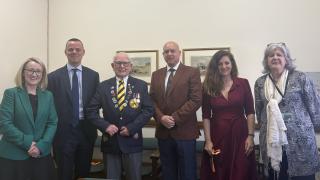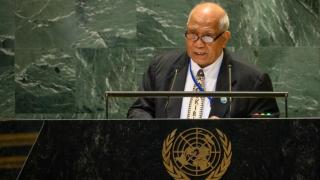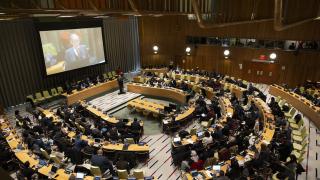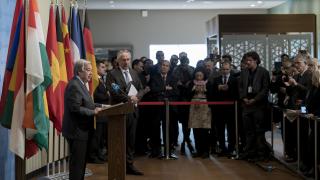
In the wake of the United States’ killing of Iranian General Qasem Soleimani and Iraqi militia commander Abu Mahdi al-Muhandis on 2 January, we have seen a worrying, if predictable, ratcheting up of tensions in the region. While the subsequent actions of the United States and Iran speak of a desire to contain the confrontation, we are deeply concerned about the prospects for a prolonged and dangerous period of tension.
Respect for international law
As we said in a letter from our Chair Lord Wood of Anfield to the Prime Minister on 3 January, the actions carried out by US President Trump likely breach international law. They set a worrying precedent which undermines the international standards that help to create a safer and more peaceful world. The Prime Minister’s failure to make this point emphatically is disappointing. We are also alarmed by the retaliatory action conducted by Iran.
Stability depends on the Iran Nuclear Deal
Since the withdrawal of the US from the nuclear deal with Iran and the imposition of sanctions, relations between Iran and the US and allies have been steadily deteriorating – with attacks on vessels in the Strait of Hormuz, a key oil route. This escalation has taken place in the context of an increasingly febrile situation in the region, as a consequence of acts of aggression by regional powers in Syria, Yemen, Bahrain, Lebanon and Iraq.
There is a pressing need to restore regional stability, particularly with respect to nuclear governance. To this end it is vital that the international community rally around the nuclear deal, which remains the best diplomatic mechanism for reducing tension and keeping the region free from nuclear weapons. With the review conference of the Nuclear Non-Proliferation Treaty due in April, this is even more pressing.
The UN must lead
The United Nations is entering its 75th year. It exists for times such as these. While conflicts involving permanent members of the Security Council are challenging for it to address, the UN has, in the past, shown a powerful ability to de-escalate tensions even in such situations. Indeed, it is the only institution with the authority and legitimacy to provide a pathway towards a lasting, stable, and secure peace in the region. States, particularly permanent members of the UN Security Council, bear the primary responsibility for maintenance of global peace and security, but in the absence of their leadership, the United Nations itself can perform vital functions.
The UN can create an environment to foster international dialogue. The UN’s senior individuals – notably the Secretary-General – can play an unmatched role in mediation. The UN’s processes can provide face-saving means for all parties to refrain from responding further.
UNA-UK feels that the United Nations could make better use of these mechanisms and processes, and will need to do so in the weeks to come. The UN has already been affected by the decision – conveyed by Secretary of State Mike Pompeo to UN Secretary-General Antonio Guterres – that America would not be issuing a visa to Iran’s Foreign Minister Javad Zarif.
Mr Zarif was scheduled to attend the United Nations on Thursday to address the Security Council. This would have been his first opportunity to speak to world leaders in the wake of last week’s events. Denying him entry goes against the 1947 “headquarters agreement” that requires the US to allow access to the United Nations for diplomats.
UNA-UK has no doubt that the Secretary-General has been working tirelessly to de-escalate the situation behind closed doors, in addition to his public statements. Depending on how the situation unfolds, we urge him to consider vigorous public diplomacy. We were pleased to see the Secretary-General extend his good offices and offer to mediate between the nations of Iran and the United States. A public offer to do so at the most senior level acceptable to both sides could build upon this welcome beginning. We also believe an unequivocal message should be sent with respect to the denial of Mr Zarif’s visa, an act which weakens the very processes that allow the United Nations to carry out its vital function as the forum for international dialogue.
Next steps
There clearly remains a risk to international peace and security. It is important that it is addressed in the appropriate forums of the United Nations. If member states are given the opportunity to discuss violations of international standards, delcare support for those standards, and express their opposition to any further escalation of tensions, it could further ease tensions and also reduce the long-term damage that is done to international standards regarding the non-use of force.
In the first instance such a discussion should happen at a formal meeting of the UN Security Council. If member states are not able to convene such a discussion, the Secretary-General has, and should always be willing to use, the power to initiate such a discussion, granted by Article 99 of the UN Charter. If the Security-Council is unable to hold effective discussions due to disagreements between the five permanent Security Council members then the “Uniting for Peace” process allows discussion to move to the General Assembly if called for by any nine members of the Security Council or a majority of members of the General Assembly.
The stakes are high. The success or failure of the United Nations in leading a process of reducing international tensions following General Soleimani’s killing will likely dictate the stability of the gulf region for years to come. How the Organisation responds to this crisis will doubtless be a factor in discussions on whether it is still able to perform its essential functions 75 years after its founding.
In recent years the need for our global system of rules and norms has been questioned as never before. One way or another critics will have their answer in how the Secretary-General manages crises such as these. We trust he will not let us down.
Photo: The UN Secretary-General António Guterres calls for a de-escalation of geopolitical tensions at a press conference at UN Headquarters on 6 January, 2020. c. UN Photo/Mark Garten

